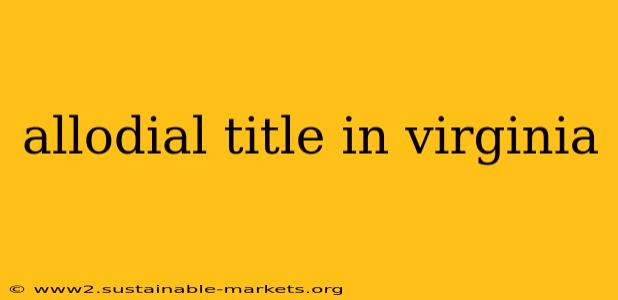Virginia's real estate landscape, steeped in history, presents unique aspects of land ownership. One often-misunderstood concept is allodial title. This guide delves into the intricacies of allodial title in Virginia, clarifying its meaning, implications, and how it differs from other forms of land ownership.
What is Allodial Title?
Unlike feudal systems where land ownership was tied to a superior lord, allodial title signifies absolute ownership of land. It represents the complete and unrestricted right to possess, use, enjoy, and dispose of the property without any obligation to a superior authority. In essence, the allodial titleholder has the fullest extent of ownership rights recognized by law.
In the context of Virginia, the concept of allodial title is largely theoretical. While the state technically recognizes the concept of absolute ownership, the reality is that all land ownership is subject to certain limitations and regulations imposed by the government. These limitations, while not negating absolute ownership, curtail the extent of absolute control.
Limitations on Allodial Title in Virginia: The Reality of Ownership
While the principle of allodial title suggests complete freedom, the practical application in Virginia faces several constraints:
1. Government Regulations:
- Zoning laws: These dictate how land can be used, restricting development based on factors like location and environmental concerns.
- Building codes: Construction projects must comply with specific safety and quality standards.
- Environmental regulations: Protections for natural resources limit activities that could harm the environment.
- Taxation: Property taxes are levied by the government, representing a claim against the property.
- Eminent domain: The government retains the right to seize private property for public use, albeit with just compensation.
These regulations, while sometimes perceived as limitations, serve crucial functions in protecting public health, safety, and welfare. They are an inherent aspect of land ownership in Virginia, and understanding them is key to responsible land management.
2. Encumbrances:
Even with allodial title, properties can be subject to various encumbrances, including:
- Mortgages: Liens placed on the property to secure a loan.
- Easements: Rights granted to others to use a portion of the land (e.g., utility easements).
- Liens: Claims against the property due to unpaid debts or taxes.
These encumbrances represent limitations on the complete and unrestricted use of the property.
Allodial Title vs. Other Forms of Ownership in Virginia
It's crucial to distinguish allodial title from other forms of land ownership:
- Fee simple: This is the most complete form of ownership recognized in Virginia. While often used interchangeably with allodial title, fee simple acknowledges the limitations imposed by government regulations.
- Leasehold estates: These involve the right to possess and use land for a specified period, but not full ownership.
- Condominiums and cooperatives: These involve ownership of a specific unit within a larger development.
Practical Implications for Virginia Landowners
Understanding the nuances of allodial title and its practical limitations in Virginia is critical for informed decision-making. While you hold the fee simple title, the concept of absolute, unrestricted ownership in the true sense of allodial title is qualified by governmental regulations and potential encumbrances.
It's always recommended to consult with a qualified Virginia real estate attorney or land surveyor for specific advice regarding your property rights and responsibilities. They can help you navigate the complexities of land ownership and ensure you fully understand your rights and limitations.
This understanding provides a clearer perspective on your land ownership rights, fostering responsible land stewardship and informed decision-making within the context of Virginia law.

